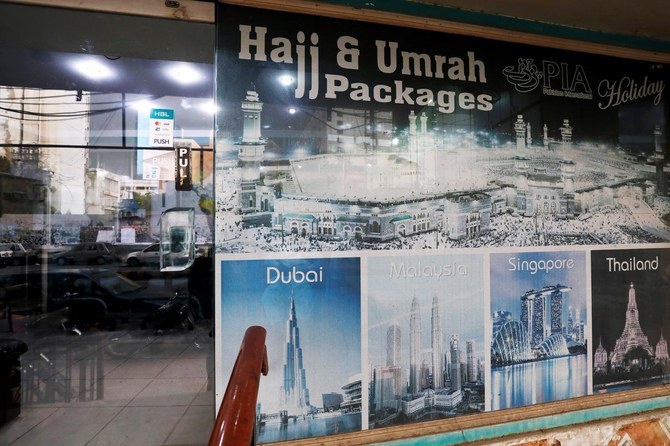KARACHI: As Saudi authorities partially lifted a coronavirus ban on performing the Umrah last week, Pakistani tour operators who arrange the pilgrimage each year rejoiced, offering special prayers in anticipation of international pilgrims once again being allowed into the Kingdom, starting November.
Saudi Arabia — which suspended the Umran and held a largely symbolic Hajj earlier this year to curb the spread of the coronavirus — on Sunday allowed citizens and residents to start performing Umrah at 30 percent capacity, or 6,000 pilgrims a day. The number of pilgrims will be increased to 15,000 per day from October 18, 2020, and the pilgrimage will open for Muslims from abroad starting November 1.
“Saudi Arabia has revived Umrah after eight months of lockdown in a phased manner and in a perfect way which is a very good step and people are rejoicing the decision by offering nafl [non-obligatory] prayers,” Affan Zeeshan, the chairman of the Sindh zone of the Hajj Organizers Association of Pakistan (HOAP), told Arab News on Monday. “It is a ray of hope for Pakistani religious tourism organizers.”
“I was in touch with the people who performed the Umrah on the first day and they gave very
good feedback,” Zeeshan added. “The whole system was very well organized with all SOPs [standard operating procedures] implemented.”
The Umrah, a pilgrimage that can be undertaken at any time around the year, drew 19 million visitors to Saudi Arabia last year.
In Pakistan, the suspension of the pilgrimage has grounded the religious tourism business, with almost 80-90 percent companies shuttering due to the pandemic or switching to alternatives trades.
“Many travel operators have found alternates,” said Faisal Naeem, chairman of Hajj and Umrah committee of Karachi Chambers of Commerce and Industry. “Small operators who could not survive have closed down business while others have sent their employees on unpaid leaves.”
Now, tour operators await details of SOPs for international travelers.
“People are following a wait-and-see policy.” said Muhammad Bilal Fasih, the convener of the Central Committee on Hajj and Umrah Services at the Federation of Pakistan Chamber of Commerce and Industry. “The specter of the second wave of coronavirus is also one of the reasons of the slow decision-making of operators.”
What policy Saudi Arabia opts for, including on airline tickets and hotel expenses, will determine the pace and number of pilgrims from Pakistan.
“Last year the flight cost [ticket price] was between Rs 55,000 to Rs 65,000 and this year it is expected that airlines would follow social distancing by keeping one seat vacant, which may increase the price of ticket,” Naeem said.
Tour operators also expect the Kingdom will implement a quota system whereby only a certain number of pilgrims would be allowed from each country.
“We expect that after the trial period the Umrah will resume to a large extent but still the operation of Pakistani operators would be limited,” Fasih said. “Business will not be as usual like before COVID-19.”
Pilgrimage is the backbone of a plan to expand tourism under Crown Prince Mohammed bin Salman’s drive to diversify the economy of the world’s top oil exporter. The Saudi government had aimed to boost Umrah visitors to 15 million by 2020, a plan disrupted by coronavirus, and to 30 million by 2030.
Religious pilgrimage generates $12 billion in revenues from worshippers’ lodging, transport, gifts, food and fees, according to official data.
Saudi Arabia hosted a drastically reduced Hajj in late July for the first time in modern history, allowing only a few thousand domestic pilgrims instead of the usual sea of some three million Muslims from around the world.


















